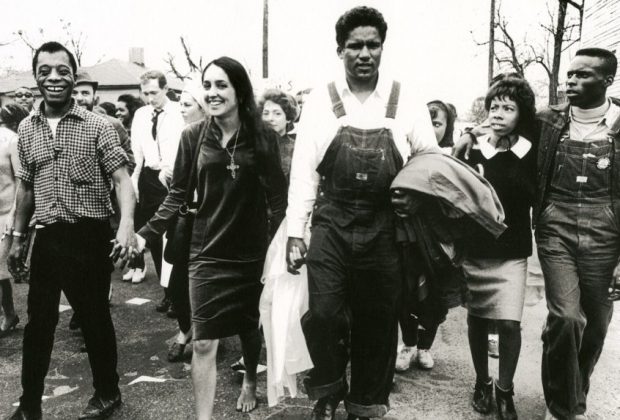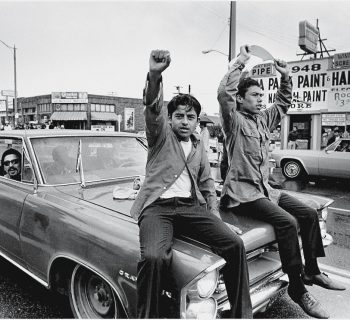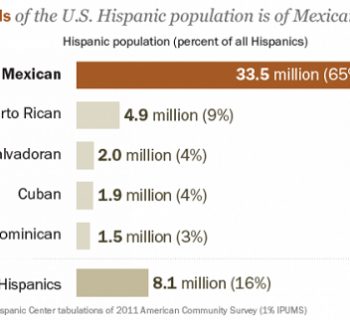Joan Baez’ Mexican American background was "huge" for her, both as a source of insecurity and empathy, said “I am a Noise” filmmaker Miri Navasky.
By Raul A. Reyes | NBC News | OCT. 6, 2023 | Photo By Matt Heron
One of America’s best-known folksingers was around 13 the first time somebody called her “a dumb Mexican.”
Joan Baez says in a new film that a teacher told her that she “was the highest breed of Spanish.” But “Joanie” Baez, as she was then called, was not having it. “I told her no, I’m not. I’m a Mexican. I was defending the Mexican race.”
Now a new documentary takes a look at the life and legacy of the iconic singer, songwriter and activist. In “Joan Baez: I Am a Noise,” filmmakers follow her on her final concert tour in 2018-19 and delve into her archive of home movies, artwork and diaries. In addition to highlighting Baez’s lifelong commitment to social justice, the film explores issues of fame, identity, aging and forgiveness.
Baez, 82, was raised in the San Francisco Bay area. Her father was a Mexican-born physicist, and her mother was of Scottish descent. Converts to Quakerism, Baez’s parents instilled a social consciousness in her from a young age. Baez recalls in the film that, as a child, “I was aware that there were sorrows way greater than mine.”
Growing up, Baez often felt like an outsider. “I thought I was inferior, especially to the white kids, and the rich kids,” Baez says in the film. “Most of the time at school, I felt ‘less than.'”
“I Am a Noise” Miri Navasky, one of the film's three directors, said that Baez’s Mexican American heritage was “foundational” for the singer. “It was huge for her, both as an insecurity, and as a source of empathy. ... I think that followed her through her whole life, and to some degree, still does.”
Singing was Baez’s escape, her source of joy — and it led to what became an extraordinary career. A college dropout, Baez was singing barefoot in small coffeehouses around Boston when she was invited to perform at the 1959 Newport Folk Festival. There she was “discovered” and began a meteoric rise to fame. She sang at Carnegie Hall before she was 18 and landed on the cover of Time magazine at 21. “For whatever reason,” Baez says in the film, “I think I was the right voice at the right time.”
Baez’s crystal-clear soprano and her activism placed her at the center of several musical and political movements. She sparked a resurgence of American folk music, sang at both the landmark 1963 March on Washington and at Woodstock, and helped bring Bob Dylan to prominence. She was in the fields with Cesar Chavez when he was organizing farmworkers and was visited in jail by Martin Luther King Jr. after being arrested for protesting the Vietnam War.
“She has always believed in the fight for the underdog, in social change, in nonviolence. She’s never wavered from these areas of political activity,” said “I Am a Noise” co-director Maeve O’Boyle. “She’s fought for what she believes in, her entire life. And running parallel to this is an incredible musicality, a love of creativity across the board.”
In the post-war years, there were many young people excited about the possibilities of new forms of self-expression and new ways of thinking, said New York University arts professor Richard Litvin. “Then this brilliant young woman comes on the scene; she has obvious musical gifts and is charismatic, courageous and willing to be present for causes she believed in.”
Baez has sung on over 30 albums and scored a Top 5 hit with “The Night They Drove Old Dixie Down” in 1971. Other iconic songs include the Top 40 "Diamonds & Rust," "Farewell, Angelina," "We Shall Overcome" and "Birmingham Sunday," about the 1963 Ku Klux Klan's bombing of a church in Alabama that killed four black girls.
She also released a Spanish-language album in 1974, "Gracias a la Vida," dedicated to the people suffering in Chile under the rule of the right-wing military dictator Augusto Pinochet.
“I Am a Noise” was filmed over several years and captures Baez’s “Fare Thee Well” tour. “It became a real honor to document her in these moments,” O’Boyle said. “Just to watch her on stage singing these incredible songs that have spanned 60 years was amazing. Witnessing her saying goodbye to that part of her life was a true honor.”
Karen O’Connor, another co-director, notes that shooting the documentary was “emotionally complicated. ... Joan was ready to open her life, to us and the world, but there was a level of trust involved.” Baez did not have final approval over the film.
As shooting progressed, Baez gave the filmmakers complete access to her personal archives. “The big act of total trust was just giving them the key" to her storage unit, Baez told The New Yorker in September. “I really thought it was lampshades and old plates. I didn’t know that my father and mother kept everything. All the tapes I’d ever sent them, all the letters I’d ever written, all the drawings.”
These resources changed the course of the film, according to O’Connor. “She basically turned over her entire family archive to us, which shifted the film in a very different way than we had imagined.” The filmmakers were able to examine some of Baez’s most personal struggles, including long-held family secrets.
“Joan Baez: I Am a Noise” premiered at the 2023 Berlin International Film Festival. It opens in New York City on Friday, Oct. 6, prior to a wider release. Deadline called the film “rewarding for revealing a major cultural personality in a satisfying fullness.”
Aside from performing, Baez has remained relevant for decades, often in surprising ways. In the early 1980s, she dated Apple co-founder Steve Jobs. In 2015, Taylor Swift invited her and Julia Roberts to dance on stage with her at a concert; four years later Baez sang with Lana Del Rey at a performance in Berkeley, California. Last year, Baez visited Ukraine with the Ukraine Children’s Action Project, helping raise awareness for the war’s youngest victims.
“Joan Baez captured the imagination of a generation. Maybe it was luck, her gifts, or her beautiful energy — but not everyone has the opportunity to be a singer, an artist, while taking on so many problems of the world,” said Litvin, of NYU. “This is what a full life looks like.”
Baez received a Lifetime Achievement Grammy Award in 2007. She was inducted into the Rock & Roll Hall of Fame in 2017 and received the Kennedy Center Honor in 2021.







